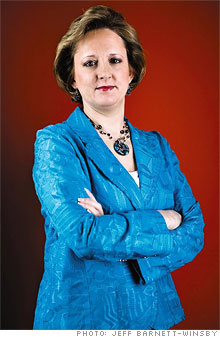How I just said no to low-cost offshoring
We couldn't match the prices of our overseas rivals. But we beat them with service and marketing.
(FSB Magazine) DANBURY, Conn. -- I love a challenge. But I was discouraged by the reaction one of my sales reps got when she asked a university bookshop in Boulder to carry our custom diploma frames. The manager told us she could barely get students to buy low-end metal models. "How do you expect me to sell a $99 product if I can move only 30 frames a year at $34.95?" she asked. I knew from the prices she was charging that she had chosen a brand that was mass-produced overseas. The encounter was a harsh reminder of how much work I had to do to keep my firm alive.
Competition from the Far East was the last thing on my mind when I started Church Hill Classics in the basement of my house in Newtown, Conn. As a former corporate marketing executive, I had noticed that few university bookstores sold top-quality frames that incorporated their school logos. I decided to fill this niche. Starting with my alma mater, Dartmouth College, I built my company into a one-stop source. Today nearly 700 campus bookstores carry our products. We expect to bring in $6 million in sales this year and are profitable.
Manufacturers in Asia began flooding the market with cheap frames about ten years ago. Many of my rivals in the U.S. caved in to the price pressure. If I wanted to join them, I knew I would have to move my 30,000-square-foot plant overseas and buy lower-priced materials or lay off workers and squeeze more productivity out of the ones who were left. I didn't like those choices. I believe strongly in trying to keep jobs in the U.S. and in treating my 49 employees fairly. And I didn't want to undo our reputation for quality craftsmanship.
I searched for something I could offer that foreign competitors could not. I realized it was my marketing experience. I had worked with the store managers for years and knew what they needed better than any new, distant rival ever could. And I knew how to customize a marketing program for each one.
I created a test campaign for Dartmouth. Our sales brochures featured school-specific frames we had designed. We created signs and displays for the stores that mentioned Dartmouth's name. And we invested aggressively in reaching our prime targets - the parents of graduating seniors - with direct-mail campaigns. Once we had evidence that our new approach worked, we persuaded most of our other clients to try it. On average, the campus stores' sales of our goods more than tripled the first year.
That data caught the attention of the shop manager in Boulder. So we made her an offer: If she would carry our wares for a few months, we would lower our minimum order and allow her a better profit than her existing supplier offered. She signed on. Five years later, her customers buy 800 frames a year. Her top seller retails for $224.99.
There is no standing still, though. We have to keep our competitive blade sharp. To make it easy for bookstores to work with us, we upgrade our website and offer new customization options constantly. We've added matching desk accessories they can sell. By handling stores' order fulfillment, we help them keep inventory low. And we give stores a detailed analysis of their sales of our products each year to help keep revenues growing.
Undoubtedly, foreign manufacturers will continue to try to poach my customers by offering rock-bottom deals. But as far as I can see, this is where their competitive strategy ends. Rather than join the price war, I'd prefer to outdo them with quality products, creative marketing, and great service. I don't see them catching up in those areas anytime soon. ![]()
-
The Cheesecake Factory created smaller portions to survive the downturn. Play
-
A breeder of award-winning marijuana seeds is following the money and heading to the U.S. More
-
Most small businesses die within five years, but Amish businesses have a survival rate north of 90%. More
-
The 10 most popular franchise brands over the past decade -- and their failure rates. More
-
These firms are the last left in America making iconic products now in their twilight. More









